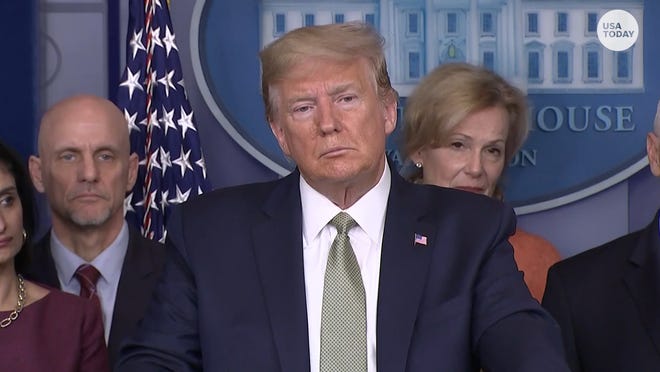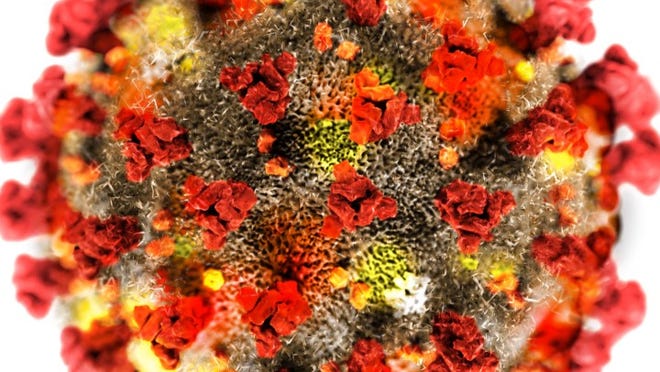Courtney Subramanian Nicholas Wu David Jackson USA TODAY
WASHINGTON — President Donald Trump has doubled down on referring to the coronavirus pandemic as the "Chinese virus" as he tries to distance himself from criticism over how his administration is handling the response to the global pandemic that has shuttered public life across the U.S., roiled stock markets and left more than 200 people dead in the U.S.
The president again defended his use of the term Wednesday despite mounting criticism among Asian-American advocates, health experts and Democratic lawmakers who warn referring to the virus by a location-specific name stigmatizes certain ethnic groups.
"It's not racist at all, no," Trump told reporters at a coronavirus task force news conference Wednesday when asked about his preferred label. "It comes from China. I want to be accurate." He said he was not concerned about Chinese Americans' concerns about racism, either.
Secretary of State Mike Pompeo has also used the phrase, describing it at multiple press conferences as a "Chinese" virus and a "Wuhan" virus after the city in China where researchers say coronavirus originated.
But race and global health experts argue describing COVID-19 as a "Chinese" virus exacerbates xenophobia amid the rapidly unfolding outbreak while Chinese officials remain rankled by Trump's repeated use of the phrase. Washington and Beijing have blamed one another for mishandling the spread of coronavirus as each country grapples with the pandemic's widening fallout that has battered the world's two largest economies.
Trump and several of his congressional allies continue to use that language to paint the coronavirus crisis as a foreign threat, according to Gordon H. Chang, a professor of history at Stanford University.
"It's an effective political way to rally people, deflect the attention away from his administration's response to this crisis, find a scapegoat and continue this hostility of blaming climate change, trade wars and now disease on China," he said. "These are not words that are just plucked out of the blue but they're part of a pattern that's been going on for a long time to vilify China."
The president has used the words "Chinese virus" in spoken remarks four times since Sunday, often mentioning the term in his opening comments at daily White House press conferences. He also has tweeted about the term six times this week.
“The world is paying a very big price for what they did,” Trump told reporters Thursday as he again accused Chinese officials of withholding information about the virus.

The president likes the term so much he marked up the prepared text he read from at the start of Thursday's coronavirus briefing - striking out the word "corona" and writing in "Chinese," according to a photo by Washington Post photographer Jabin Botsford.
"It calls up this cultural idea about race as biological," said MarYam Hamedani, managing director at SPARQ (Social Psychological Answers to Real-World Questions), a Stanford University center focused on social problems. "This kind of language really incites the idea of racial difference and that there's something fundamentally different and essential between us, and that Asians, by their race, are more likely to have or carry or be associated with the virus."
She said her center has been tracking an uptick in bias discrimination, micro-aggressions and even direct assaults against Asian Americans as the virus spreads across the U.S. Last week a national coalition of Asian organizations penned a letter to Congress about an alarming uptick in incidents targeting Asian Americans in the wake of coronavirus.
When pressed about it earlier this week, Trump told reporters Tuesday he decided to describe it as a "Chinese virus" to dispute a disinformation campaign circulated by some Beijing officials that the American military brought the virus to Wuhan.
Fact check: Coronavirus originated in China, not elsewhere, researchers and studies say
The World Health Organization has urged people to be careful with language used to describe COVID-19, insisting that it not be referred to as the "Chinese" or "Wuhan" virus. Any mention of location could lead to discrimination or stigmatization, the group warns.
Health and Human Services Secretary Alex Azar has also rejected use of the term, noting last month that "ethnicity is not what causes the novel coronavirus" while Centers for Disease Control and Prevention chief Robert Redfield told lawmakers last week it was "absolutely wrong and inappropriate" to refer to it as a "Chinese virus." The Trump campaign channeled the president's war of words with Beijing this week, sending out an email to supporters claiming America is "under attack" by China.
From 'great' to 'blindsided': How Trump changed his coronavirus message amid fear, confusion in the White House

Noting attempts by officials in China to blame the United States for the virus, the Trump campaign email also accused former Vice President Joe Biden of "siding with the Chinese and attacking the presidential candidate China fears most: Donald Trump."
The email, designed to mobilize Trump backers, listed a number of comments the former vice president has said about China over the years, and claimed he "has repeatedly downplayed the threat posed by China and defended the regime."
Biden has criticized both China and Trump administration policy toward the country, particularly the tariffs he has imposed during his trade war with the Chinese. He also called on Trump to pressure the Chinese into disclosing more information on the origin of the coronavirus.
T.J. Ducklo, a Biden spokesman, said Trump is projecting his own faults onto others, noting that U.S. tariffs on China and other countries have increased the costs of medical supplies among other items.
"They are trying to attack Vice President Biden on an issue that President Trump has badly mishandled," Ducklo said.
Trump campaign spokesperson Tim Murtaugh said the campaign was just trying to deal with "misinformation" about the presidential response to the virus.
"The President’s campaign will fight the misinformation and set the record straight while the President does his job and protects the interests of this country," Murtaugh said in a statement.
Fred Guttenberg, a Biden supporter and gun control advocate who lost his daughter in the 2018 high school shooting in Parkland, Florida, tweeted that it looks like Trump "is using coronavirus to campaign, saying America is under attack from the Chinese and saying Biden is with China."
The president's comments are a marked departure from the praise he offered Chinese President Xi Jinping just two months ago as he sought to downplay concerns of a looming pandemic.
"China has been working very hard to contain the Coronavirus. The United States greatly appreciates their efforts and transparency," Trump tweeted on Jan. 24. "It will all work out well. In particular, on behalf of the American People, I want to thank President Xi!"
The shift in rhetoric, some Democratic lawmakers say, is an attempt to distract voters from Trump's slow response to the coronavirus.
Rep. Judy Chu, D-Calif., the chair of the Congressional Asian Pacific American Caucus, slammed Trump's use of "Chinese virus."
"No matter how much he calls it the 'Chinese virus,' no matter how many hate crimes he incites, Donald Trump cannot hide from his own failure to address this crisis from the beginning," Chu wrote in a tweet.
Rep. Mark Takano, D-Calif., said while it was a "big step forward for the country" Wednesday when a "very sober and serious" Trump addressed the urgency around COVID-19, it was disappointing "to see him be so stubborn about defending his use of the word, Chinese virus, the term Chinese virus."
But the president's labeling of coronavirus as a "Chinese virus," implies that it's associated with a sick culture, said Chang, the history professor.
"This virus came from a place. To call it a Chinese virus is to call it Chinese food and associate it with a culture and a society," Chang said, noting that AIDS wasn't referred to as "American AIDS."
"These diseases know no boundaries, they don't carry passports, they're not citizens and they don't speak a certain language."
No comments:
Post a Comment